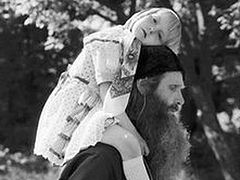Question: "What do we mean by the "nous," how is it distinct from the soul, and are the Orthodox the only ones who speak about the "nous"?"
This question is complicated by the fact that the word "nous" (which is usually translated into English as "mind" has been used in different senses, at different times. The best discussion on this topic I have come across is found in Metropolitan Hierotheos (Vlachos)'s book "Orthodox Psychotherapy: The science of the Fathers" (pp. 118-156 (the title might lead you to think that this is a book about psychiatry, but it is about the healing of the soul, which is what "psychotherapy" literally means)). A shorter summary of the question can be found in an excerpt from the book "Patristic Theology," by Fr. John Romanides, which is available online: "What is the Human Nous?" Fr. John Romanides says in part:
"The chief concern of the Orthodox Church is the healing of the human soul. The Church has always considered the soul as the part of the human being that needs healing because She has seen from Hebrew tradition, from Christ Himself, and from the Apostles that in the region of the physical heart there functions something that the Fathers called the nous. In other words, the Fathers took the traditional term nous, which means both intellect (dianoia) and speech or reason (logos), and gave it a different meaning. They used nous to refer to this noetic energy that functions in the heart of every spiritually healthy person. We do not know when this change in meaning took place, because we know that some Fathers used the same word nous to refer to reason as well as to this noetic energy that descends and functions in the region of the heart.
So from this perspective, noetic activity is an activity essential to the soul. It functions in the brain as the reason; it simultaneously functions in the heart as the nous. In other words, the same organ, the nous, prays ceaselessly in the heart and simultaneously thinks about mathematical problems, for example, or anything else in the brain.
We should point out that there is a difference in terminology between St. Paul and the Fathers. What St. Paul calls the nous is the same as what the Fathers call dianoia. When the Apostle Paul says, "I will pray with the spirit,"[1 Corinthians 14:5.] he means what the Fathers mean when they say, "I will pray with the nous." And when he says, "I will pray with the nous," he means "I will pray with the intellect (dianoia)." When the Fathers use the word nous, the Apostle Paul uses the word "spirit." When he says "I will pray with the nous, I will pray with the spirit" or when he says "I will chant with the nous, I will chant with the spirit," and when he says "the Spirit of God bears witness to our spirit,"[Romans 8:16] he uses the word "spirit" to mean what the Fathers refer to as the nous. And by the word nous, he means the intellect or reason."
A few other points that Metropolitan Hierotheos makes on this subject:
- Many Fathers use the words "nous" and "soul" interchangeably.
- St. John of Damascus says that the nous is the purest part of the soul.
- St. Gregory Palamas uses the word "nous" in two senses: as the whole soul, and also as the power of the soul.
- In Scripture and in many of the Fathers there is an identification of the nous with the heart, and the terms are used interchangeably.
- Other Fathers use the term "nous" to refer to refer to "attention" as opposed to reasoning. And so for example, when we pray, we may be reading our prayers with our intellect, but our attention wanders. And so when one achieves the prayer of the heart, our attention (the nous) returns to the heart, and we truly pray.
Contemporary Protestants will typically only talk about the "nous" to the extent that they find references to it in in Scripture, and they generally would not spend a lot of time (if any) trying to understand what the Fathers had to say about those passages. Being influence by American pragmatism, they would also tend to see spending time focusing on the nuances of the mind, heart, and soul of a person to be of little use to the bottom line questions of how one is saved, and how we should live our lives, which they tend to see in far more simple terms, and look for far more simple answers.
If you were an Eskimo, you would speak about various forms of frozen water with subtle distinctions that would be lost on tribesmen who live near the equator, because those people don't often encounter frozen water, and so hail, snow, sleet, etc, would be seen as being pretty much the same thing. Whereas for you, ice, snow, sleet, and all the subtle variations one encounters of those things would be a pervasive reality that would never be far from your thoughts. The saints of the Church spent their lives waging spiritual warfare, and so speak about the aspects of the soul in very subtle ways, compared to those who think that if you say a prayer and ask Christ into your heart, that you are saved, and couldn't lose your salvation if you tried.





then there is a better explanation of the nous and it should be better explored in understanding hesychia and the teaching of Saint Gregory Palamas. However, you should consult your spiritual father if you are on a spiritual level to read this!
In abbreviated form, St.Gregory teaches that the soul is divided into nous, imagination, opinion, mind and sense perception. Man consists of the nous and the senses. In between those lie imagination, opinion, and mind. The nous also has essence and energy which are different.I'll stop here.. more on p.155 of the book mentioned above.